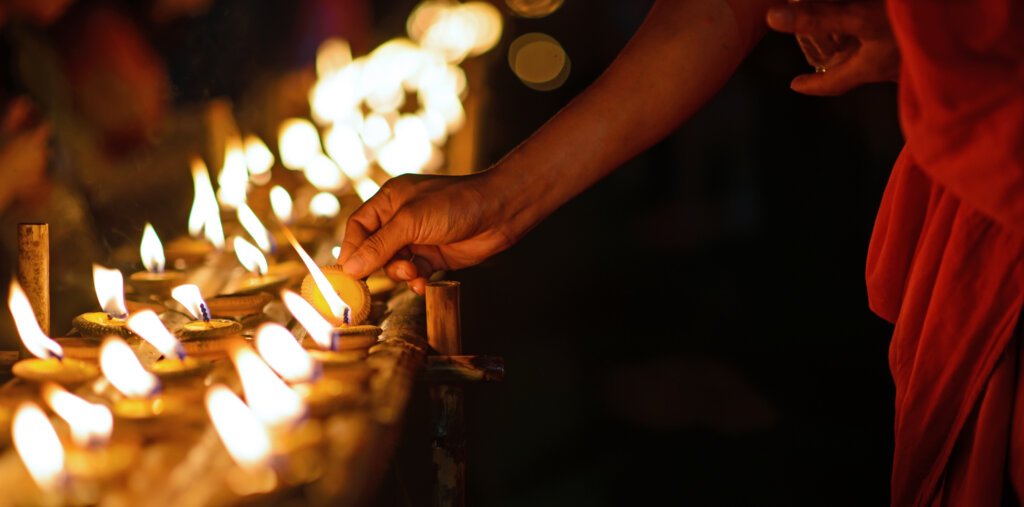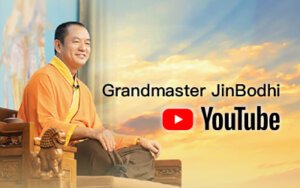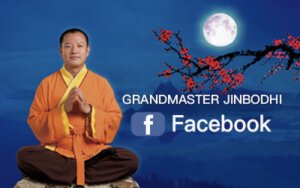
How can we distinguish clearly between the Hungry Ghost Festival and the Ullambana Festival? In most Asian countries, on the 15th day of the lunar seventh month each year, people hold grand Hungry Ghost Festival events and activities, such as chanting to pray for peace and health for their loved ones and make abundant offerings to worship the deceased and all sentient beings with whom they are related and connected. However, Buddhist practitioners are often confused when it comes to differentiating between the Hungry Ghost Festival and the Ullambana Festival. What are the differences between the two? Are their origins and the objects of worship different?
About the Hungry Ghost Festival
The Hungry Ghost Festival originated in ancient China and is divided into three festivals: the Upper Yuan Festival, the Middle Yuan Festival, and the Lower Yuan Festival. Collectively, they were known as the Three Yuan Festivals. It was originally a traditional festival of the Han ethnic group, where the emperor performed rituals to worship the heavens, the earth, and the water.
The Hungry Ghost Festival falls on the 15th day of the lunar seventh month each year. In ancient times, the emperor would offer new grain to the ancestral temple to celebrate the autumn harvest and express gratitude to the earth and the ancestors. After Taoism was integrated into the festival, people began to worship their ancestors during the Hungry Ghost Festival and prayed to the Middle Yuan Earth God to pardon the sins of their deceased relatives and expand the practice to all deceased souls, making it one of the largest folk festivals in China.
In Taiwan, the Hungry Ghost Festival originated during the Qing dynasty due to various disputes that stemmed from trading rights, land and water sources, and conflicts among immigrants with different cultural backgrounds, which caused large-scale fighting and heavy casualties among the immigrants from Zhangzhou and Quanzhou. Later, the leaders of both sides agreed to a ceasefire and replaced the bloodshed with the Ullambana Festival to resolve the ethnic conflicts. Originally, 11 groups of people with blood relations were divided based on their surnames and were responsible for taking turns to perform the main Ullambana Festival ceremony, which later developed into a grand competition among 15 surnames.
The Ullambana Festival’s rituals continue to be passed down to this day, not only as an important folk festival and activity but also as an opportunity for local governments to offer food to the underworld beings, make offerings to the Buddha and bodhisattvas, pray for national prosperity and peace, good weather, and social harmony and happiness.
Liberating Ghosts During the Hungry Ghost Festival
Legend has it that on the 15th day of the seventh lunar month each year, the gates of hell are opened to release ghosts and spirits into the human realm. The ghosts of ancestors who are properly worshipped by their descendants may return to the world to receive offerings and incense, and the lonely and neglected ghosts are left to roam and wander. Therefore, people hold various activities such as chanting, praying, and offering food during the seventh lunar month. People believe that by doing so, the compassionate Buddha and bodhisattvas can help save their loved ones in hell or other wandering beings in the world of darkness, so that they can all attain liberation. To this day, the festival has spread to other Asian countries and regions, such as Korea, Japan, Taiwan, Singapore, Malaysia, and Thailand.

About the Ullambana Festival | Origin and the Story of Maudgalyayana
The Sanskrit word “ullambana” means to rescue from being hung upside down. It is a festival where people make offerings to the Buddha and monks, carrying the incomprehensible blessings of the dharma to relieve the suffering of deceased parents who have been banished to hell. Therefore, the Ullambana Festival is also a vessel that provides sentient beings with care, safety, peace of mind, and protection. This custom of offering to monks originated from the story of Maudgalyayana saving his mother.
According to legend, Maudgalyayana, the great disciple of the Buddha with the most powerful supernatural powers among the other disciples, used his powers to save his mother from hell after attaining six supernatural abilities. However, when he tried to feed his mother, the food immediately turned to charcoal, causing him great sadness and helplessness. The frustrated Maudgalyayana then asked the Buddha for a way to save his mother.
There is a line in the Ullambana Sutra that says, “Your mother’s karmic roots are deeply rooted and cannot be solved by your own power alone. Although you are filial and your voice can move heaven and earth, the heavenly gods, earth spirits, demons, and Taoist priests, you can’t help your mother by yourself. Only by relying on the power of the 10 directions of the sangha can your mother to be liberated. I will now explain the method of salvation to relieve all difficulties and free you from suffering.”
Supernatural powers may not be able to reverse events of karma, but the power of great aspirations surely can. The Buddha then told Maudgalyayana that if he wanted to rescue his mother and liberate her from suffering, he must rely on the power of buddhadharma, which could be done by having powerful monks chant for his mother. First, he would prepare exquisite food, drink, and daily necessities to offer to the monks and invite them to chant for his parents from the past and future lifetimes. The merits gained from doing this would save Maudgalyayana’s mother. It turns out that Maudgalyayana did successfully rescue his mother and prevented her from falling into the realm of hungry ghosts again.
The Symbolism of Ullambana Festival
The Ullambana Festival commemorates Maudgalyayana, who with sincere devotion rescued his mother from the realm of hungry ghosts. Therefore, the seventh lunar month is also known as the “Filial Piety Month” or the “Month of Auspiciousness”. The Ullambana Festival is also a great opportunity for people to repay their ancestors and parents. Therefore, every year on the 15th day of the seventh lunar month, it is common for all Buddhist practitioners to hold grand Ullambana Festival dharma events and offer vegetarian food and supplies to the Buddhist monks to gain merits and dedicate the gained merits to their ancestors and parents as a form of repaying their love and kindness, allowing them to be liberated and obtain auspiciousness.
Every year, during the Ullambana Festival, Grandmaster JinBodhi holds an online Ullambana dharma event for netizens and practitioners worldwide to chant the Buddha’s name and pray for their ancestors, their parents from the past and future, aborted or stillborn infants, karmic creditors, all living beings who have been harmed, and suffering beings, helping them to attain liberation and happiness and to be reborn in good realms. It also helps participants to have a smooth-sailing and more peaceful life, and for their future generations to prosper and be auspicious.
In conclusion, the Hungry Ghost Festival features a series of sacrificial activities of the Han culture, which combines Confucianism, Buddhism, Taoism, and various cultural traditions. As well, the Ullambana Festival symbolizes a sense of filial piety and gratitude.

